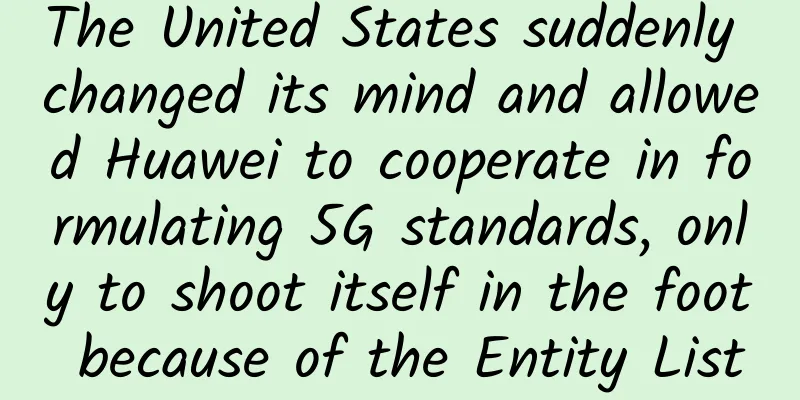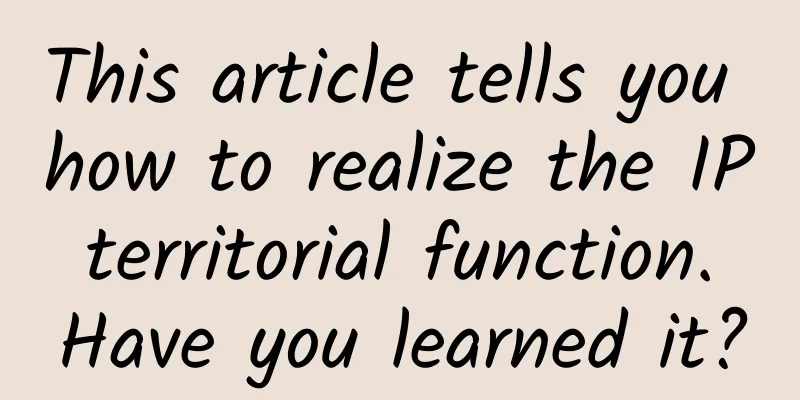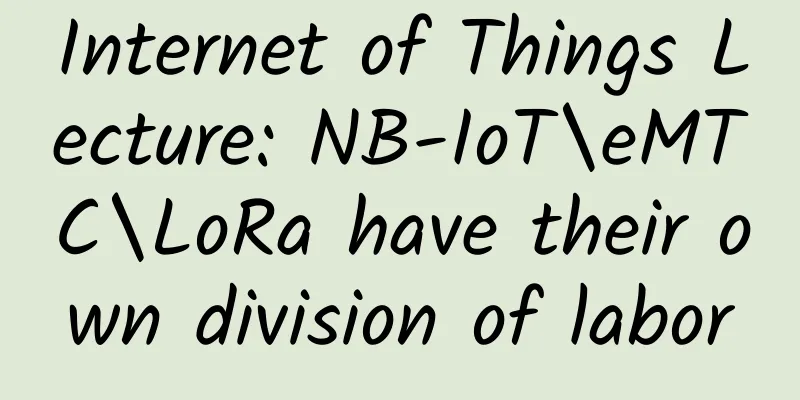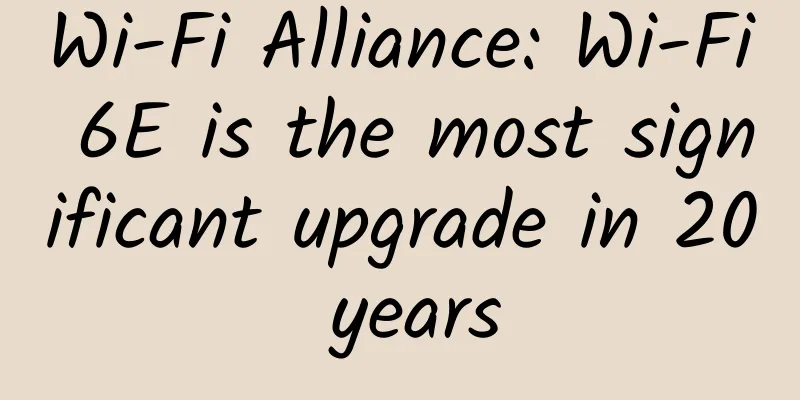The United States suddenly changed its mind and allowed Huawei to cooperate in formulating 5G standards, only to shoot itself in the foot because of the Entity List

|
This article is reprinted with permission from AI new media Quantum Bit (public account ID: QbitAI). Please contact the source for reprinting. A month later, the U.S. Department of Commerce finally confirmed: US companies will be allowed to work with Huawei to develop 5G network standards. According to Reuters, the U.S. Department of Commerce and other government agencies signed and approved the rule, which is now being prepared for publication in the Federal Register and is expected to be announced as early as Tuesday local time. The United States suddenly changed its mind and allowed Huawei to cooperate in formulating 5G standards, only to shoot itself in the foot because of the Entity List However, there has been no response from Huawei so far. As the news came out, the share prices of some related companies rose, including Micron Technology up 1.13%, Qualcomm up 1.35%, and Intel up 1.30%. Hong Kong stocks related to Huawei also continued to rise, with ZTE Corporation rising by more than 10%, Sunny Optical Technology Co., Ltd. rising by more than 7%, and BYD Electronics rising by nearly 6%. Event Details Just today, U.S. Commerce Secretary Wilbur Ross issued a statement to Reuters confirming the authenticity of the news. They will amend the ban on American companies doing business with Huawei to allow it to cooperate in setting standards for next-generation 5G networks. The rule has been approved and will be published in the Federal Register as early as Tuesday.
The United States suddenly changed its mind and allowed Huawei to cooperate in formulating 5G standards, only to shoot itself in the foot because of the Entity List As for why the rule was changed, Ross gave a very official answer: The United States will not cede global innovation leadership. The Department of Commerce is committed to fully engaging U.S. industry and advocating for U.S. technology to become international standards to protect U.S. national security and foreign policy interests. Well, that's very American. Huawei has not responded yet. So what impact will this rule have on American companies after it is enacted? Some industry insiders gave their own answers. Naomi Wilson, senior director of Asia policy at the Information Technology Industry Council, which represents Amazon, Qualcomm and Intel, said: The decision will allow U.S. companies to once again compete and lead in foundational activities, such as setting technology standards, that will help roll out advanced technologies such as 5G and artificial intelligence across markets. Kevin Wolf, a Washington trade lawyer, said the amendment "will go a long way toward helping U.S. companies maintain their leadership in international standards organizations without undermining the administration's objectives toward Huawei. It seems that in their minds, this move is only beneficial to the United States, and this rule will not change the United States' determination to restrict Huawei.
The United States suddenly changed its mind and allowed Huawei to cooperate in formulating 5G standards, only to shoot itself in the foot because of the Entity List But is it really like this? If we know more background information, we may be able to see why the United States chose to "cooperate" this time. Why collaborate? Remember the Entity List a year ago? At that time, the U.S. Department of Commerce restricted Huawei from selling goods and technology to the United States on the grounds of national security? So, the question is: Why has the United States given Huawei the green light now? The reason is that many 5G industry standards are formulated with the participation of multiple countries, including some technical standards led by Huawei. If the current Entity List policy is followed, these technical standards may be difficult to export to the United States for use. As a result, American technology companies are not sure which technologies can be shared with Huawei, and may withdraw from the formulation of standards out of concerns. Huawei will have a greater say, and the development of American companies will appear timid. Therefore, although the United States has always believed that Huawei will pose a continuous threat to U.S. security, such a threat will naturally "disappear" in the face of U.S. economic benefits. The United States suddenly changed its mind and allowed Huawei to cooperate in formulating 5G standards, only to shoot itself in the foot because of the Entity List Of course, this is not the first time that the company has "changed its face". Previously, because some telecom suppliers in remote areas needed Huawei equipment, the US Department of Commerce announced that it would allow some US companies to continue doing business with Huawei and provide it with some parts and software. They also "invented" a 90-day extension license to exempt Huawei from doing business with US companies, which is renewed every three months. So far, this is the sixth uninterrupted exemption. This also confirms what Ren Zhengfei said when he was interviewed by the media: The “Entity List” will not harm Huawei, but it will harm American companies. The U.S. government can revoke the agreement if it wants to. It doesn’t need to revoke it if it doesn’t want to. It only needs to consider the interests of American companies and doesn’t need to consider us. In addition, in a recent interview with the Wall Street Journal, Ren Zhengfei also talked about another "motive" for the United States to suppress Huawei: The United States is not simply lagging behind in 5G research and development, but it has bet on the wrong track. Ren Zhengfei pointed out that in the research and development of communication technology, the United States has placed its bets on 6G and has chosen the high frequency band of millimeter waves. This is because the United States believes that the 5G era will not arrive so soon and that there is sufficient time for 6G technology to achieve breakthroughs. However, unexpectedly, within 10 years, 5G technology has developed into an industry. Huawei has placed its bets on 5G and chosen the centimeter-wave mid-frequency band. So from this perspective, the reason why the United States continues to suppress Huawei may also be to make up for the mistakes it made before. Of course, this is just Ren Zhengfei's own opinion. What do you think of this move by the United States? |
<<: 5 reasons why SMBs shouldn’t upgrade to 5G yet
Recommend
If the Internet connection becomes slow, you don't need to change the router and restart it to restore it to full health
When you use WiFi at home to surf the Internet, i...
Sharktech: 1Gbps unlimited traffic from $79/month, 10Gbps unlimited traffic from $329/month, data centers in Los Angeles/Denver/Netherlands
Sharktech (also known as Shark Data Center, SK Da...
NIST aims to make frequency sharing more efficient for wireless networks
Machine learning solutions will help different ra...
The future is here: Will 5G users reach 2.6 billion by 2025?
This article is reproduced from the public accoun...
5G is coming: 3 ways it will benefit your business
5G is still on the way, and telecom operators are...
Outlook for domestic 5G development in 2021 (Part 2): Challenges
Relying on its significant advantages of high spe...
Smartphones supporting Wi-Fi 6/6E will dominate the market by 2025
Wi-Fi 6E will be commercially available in 2021. ...
Record-breaking! US 5G license auction turnover has reached $69.8 billion
According to the Chinese website of the Wall Stre...
How fast is 5G? Is the radiation strong? Does it have any effect on the human body? Here comes the authoritative interpretation!
What are the improvements of 5G network compared ...
"Electricity and telecommunications cooperation" to build 5G is a new interpretation of "speeding up and reducing fees"
"It used to cost 100 yuan for one person to ...
TCP/IP, UDP, HTTP, MQTT, CoAP: five IoT protocols
For software companies, the IoT model brings deci...
In the data era, Ruishu Information helps operators build a security line of defense for application data with five tips
On December 10, 2021, the "2021 (11th) Telec...
How can the chip industry survive in the era of the Internet of Things?
After the industrial revolution, the computer age...
It has become an industry consensus that multi-antenna technology is an important evolution direction of LTE
At the beginning of 2017, multi-antenna technolog...
Huawei releases MetaAAU, reducing energy consumption by 30% and improving performance and energy saving
On September 27, at the China (Beijing) Internati...









